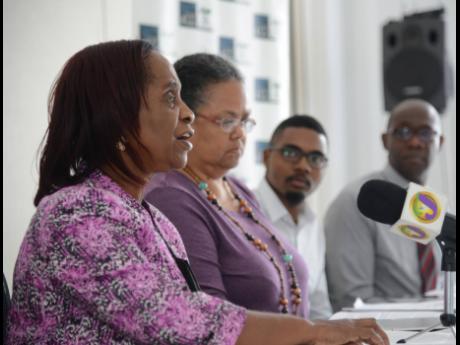Women with disabilities demand respect for maternal-health rights
“Women with disabilities can have children, take care of them, and raise very healthy families.” This was the confident assertion made by Gloria Goffe, executive director of the Combined Disabilities Association (CDA), at the Mini Health Expo held at the Half-Way Tree Transport Centre recently.
The expo, organised by the Partnership for the Promotion of Patients’ Rights in Maternal, Neonatal and Infant Health in Jamaica (MNIH) under the theme ‘Maternal Health Matters’, gave various civil-society organisations the opportunity to highlight some of the maternal-health issues faced by their communities.
Speaking on behalf of women living with disabilities, Goffe noted that there are many widely held misconceptions about the disabled community, which often lead to breaches of their health rights. Identifying the belief that women living with disabilities should be asexual and should not have children, Goffe appealed to the wider public to respect these women’s right to choose a partner and to raise a family.
Goffe also noted, “Maternal, neonatal and infant health is inextricably linked with disabilities because unhealthy mothers can lead to children with disabilities.”
Speaking specifically to the health sector, she said: “It is important for the health sector to understand the challenges we face, our capabilities, and what they need to put in place to ensure that women with disabilities have healthy pregnancies and can take care of their young ones.”
She continued: “The health sector needs to understand our needs from both a physical and infrastructural level, and also understand how to communicate with us. One simple example is for sign language to be an integral part of healthcare.”
Using the example of deaf women, Goffe noted that because there is no system in place for communication with them in many health facilities, they have to be accompanied by persons who act as interpreters. “We need a system that caters to their needs where their issues can be private,” Goffe stressed, recommending that basic sign language be taught to healthcare providers.
She added: “When the MOH (Ministry of Health) is doing public education and go into communities, they must also understand that they have to provide the messages in formats that are user-friendly for persons with disabilities.”
Expressing an understanding of the challenges involved in implementing these changes and acknowledging that improvements have been made over the years, Goffe also addressed the accessibility of health facilities to the disabled.
“Where, because of our limited economics, we cannot make everywhere accessible at the same time, because change is a long-term process, then we need the healthcare provider to understand that they need to make provisions to accommodate us,” she stated. “So, for example, where there is no lift, then the lab technician or whoever it is has to come downstairs to meet a person in a wheelchair.”
A 2011 population census conducted by the Statistical Institute of Jamaica identified over 500,000 persons with various disabilities in the island.
The health expo was put on in recognition of International Day for Maternal Health and Rights. It saw over 300 persons accessing free blood pressure, blood glucose, HIV and syphilis testing; sight screening learning; and about maternal health and rights. The expo was also used to showcase the work MNIH has done as part of the Partnership for the Reduction of Maternal and Child Mortality in Jamaica.

